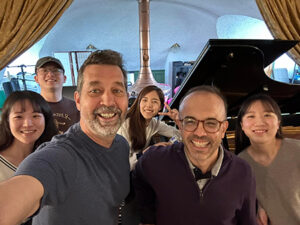
At the conclusion of recording, Derek Polischuk (right) celebrates with Blue Griffin Recording owner and producer Sergei Kvitko and the four students who contributed to the recording, (L-R) Sungyeon Ahn, Chang Li, Euyjong Choi, and Jiwoon Sim.
Teaching music and showing students how to navigate a successful, creative music career does not end on the stage or in the classroom for Michigan State University College of Music professors. Their passion and drive to educate extends to the books and recordings they produce, and the MSU Humanities and Arts Research Program (HARP) is helping fund research, recording, production, and publication of four such projects this year.
MSU Professor and Director of Piano Pedagogy Derek Polischuk is an author and serves as president of the Michigan Music Teachers Association (MMTA). A HARP grant enabled him to commission and record an original piece in 2012, and a second HARP grant funded a two-piano recording of works by Latin American composers in 2019. He said he is thrilled to receive his third HARP grant in support of his latest project, a recording of pieces by women for two pianos and piano four hands.
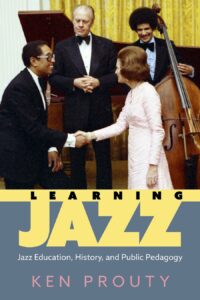
Ken Prouty’s newest book, Learning Jazz: Jazz Education, History, and Public Pedagogy, is due out in December and was funded in part by an MSU HARP grant, his second.
“I was very eager to undertake a project that begins to address the way women composers have been ignored in the piano canon, as well as work with the doctoral students I am making this record with,” he said.
MSU graduate students Jiwoon Sim, Euyjong Choi, Sungyeon Ahn, and Chang Li contributed recording, post-production, liner notes, and cover art of the new project that features composers Joan Trimble, Amy Beach, Cecile Chaminade, and Marie Jaëll.
“We concluded these works early in September 2023, and Sergei Kvitko at Blue Griffin Recording is currently working on final edits,” Polischuk said. “We hope to release this CD later this year. We have performed these works at MSU and in Detroit. We will also present lecture-recitals featuring these works at the MMTA Conference and at the Music Teachers National Association Conference in Atlanta in March 2024.”
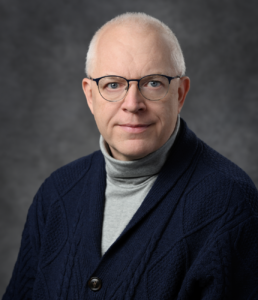
In 2012, a HARP grant helped Ken Prouty with initial research on his book, Knowing Jazz: Community, Pedagogy, and Canon in the Information Age. Now, his second HARP grant brings it full circle with his new book serving as a kind of extension of the first.
MSU Associate Professor of Musicology and Jazz Studies Kenneth Prouty also received a HARP grant this year. He teaches courses in jazz history, American and popular music., and the grant will fund his new book Learning Jazz: Jazz Education, History, and Public Pedagogy set to be released December 15 by University Press of Mississippi.
Like Polischuk, Prouty received his first HARP grant in 2012 that helped with initial research on a book project, Knowing Jazz: Community, Pedagogy, and Canon in the Information Age. Now, his 2023 grant brings it all together given that his new book serves as a kind of extension to his 2012 book.
“In this book, I’m talking about different kinds of learning contexts in jazz that are sometimes overlooked,” Prouty said. “Some of those involve publishing of educational materials in jazz, the way that jazz is learned and taught in educational institutions, and some of these also involve what I’m calling public pedagogy.”

Randy Napoleon (right) toured and recorded with Freddy Cole for 13 years before Cole’s passing in 2020.
After the core jazz audience peaking in the ‘50s, and declining since, there is a pressure of current jazz listeners and musicians to take care of the genre, appreciate the music, and share it, he said.
“There’s always this imperative we seem to have in jazz among musicians, scholars, and people who are advocates for this music that we always need to be educating potential audiences,” he said. “The hope is to start new conversations about the way jazz is learned and taught, and in doing so, about what jazz means for people in various communities.”
Prouty anticipates the book will be available for preview on Google Books before the official December release, as well as available in most major academic libraries within the next few months, and he is grateful to MSU for the HARP Program.
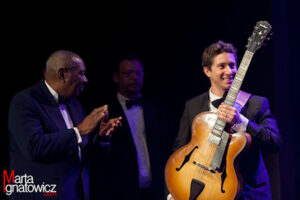
Randy Napoleon (right) describes Freddy Cole as his mentor, and now Napoleon will honor him with a new album he plans to record next year with the support of an MSU HARP grant.
“It’s always nice to see the university offering this kind of support for scholars to get their work out there in what is an increasingly challenging environment for academic work to be coming out,” he said.
MSU Associate Professor of Jazz Guitar and Associate Director of Jazz Studies Randy Napoleon, like other in-demand professional jazz artists, tours, teaches, writes, and records as part of a very full schedule. He, too, is appreciative when MSU lends its support to these activities.
“To do a CD right takes money to be able to fly people and pay them for their time. Getting time in a good studio with a good engineer, it’s all expensive,” he said. “This grant is really making it possible; otherwise the music would just live in my head.”
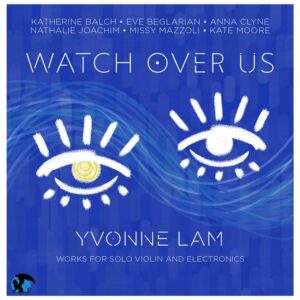
“Watch Over Us,” by Yvonne Lam, features works by Nathalie Joachim, Missy Mazzoli, Katherine Balch, Anna Clyne, Eve Beglarian, and Kate Moore. It was supported by a HARP grant and produced at Blue Griffin Recording.
It is a good thing for jazz fans that musicians like Napoleon have support for their art. Previously, he received a HARP grant that facilitated his critically acclaimed record Rust Belt Roots, a collection of tunes paying homage to jazz guitar greats Wes Montgomery, Grant Green, and Kenny Burrell. This second HARP grant means a lot to him.
“This one is actually even more personal for me because it focuses on the legacy of the Cole family, Nat King Cole and, in particular, Freddy Cole who was Nat’s youngest brother and my mentor,” Napoleon explained. “I traveled in Freddy’s band for 13 years right up until the time he passed.”
To connect even more to the Cole legacy, Napoleon plans to record some of the album with Elias Bailey and Quentin Baxter who he played with in Freddy Cole’s band. The record, an Origin Records project that he will title The Cole School, will also feature solo guitar pieces and duo songs with Los Angeles vocalist Melissa Morgan with a planned released later in 2024.
Already released is Watch Over Us, the first solo album by MSU Assistant Professor of Violin Yvonne Lam. A HARP-funded project on the Blue Griffin Recording label, the album made its debut in July 2023 and brings the total of HARP grants awarded to MSU Music faculty this year to four among 13 awarded in total.
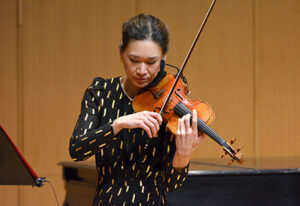
1/17/2023, 2023 Lunar New Year Celebration, at Cook Recital Hall, artists includes Mike Chen, Chen-Yu Huang, Yvonne Lam, Joseph Lulloff, Sarah Plum, Ivo Shin, Yu-Lien The, Mingzhe Wang and with speaker President Theresa Woodruff
Copyright 2023 Michigan State University Board of Trustees, College of Music
Lam is a Grammy-winning musician from her days as a member of innovative and renowned ensemble Eighth Blackbird. On the MSU Music faculty since 2019, she maintains an active studio and leads the college’s chamber music program.
The album’s title track, written by Nathalie Joachim, was meant for a documentary film that never materialized, but the work inspired Lam’s record. The album features solo violin and works for solo violin and electronics, all written by women. In addition to Joachim, composers include Missy Mazzoli, Katherine Balch, Anna Clyne, Eve Beglarian, and Kate Moore.
“Even though I am the only live performer in each piece, it never feels like a solo,” Lam writes in the Watch Over Us liner notes. “I actually feel that I am, in a way, performing with the composer who created the fixed media part exactly to their taste. Over time, performing with these tapes felt akin to playing with a longtime chamber music partner whose intentions you can divine with your gut and whose sounds combine with yours to become something larger than the sum of its parts.”
In the end, that is what MSU HARP grants are doing for MSU Music faculty. They are helping to fund creative projects that add up to a body of work by dedicated artists and researchers that continues to grow with each year.








